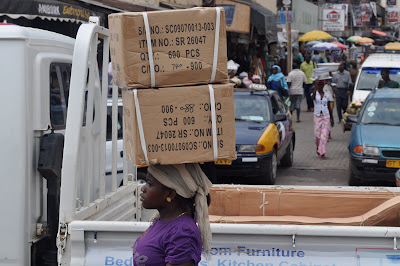 |
| The streets of Accra |
The drive through the red clay streets of town took us through beautifully manicured gardens just as quickly as it brought us through neighborhoods of makeshift houses consisting of corrugated sheet metal and wandering donkeys (quite the traffic jam when one ends up in the road!) Our hotel, Hotel Tamana, is fantastic, right down to the mosquito nets. I'm sitting at the patio now, working through some video from last night's adventure.
Our first day could not have come together better. Despite my concerns over Ramadan's effect on the live music scene, there was a group playing at Toumani Diabate's haunt that included two of his brothers and his sister (pictured below). The brothers each played kora, and I had the opportunity to speak with one of them during the show. He will be coming by later, and my kora work will be well on its way by day 2. Unlike time spent in Ghana, this week in Mali appears to be off to a busy start... No time for wandering the city! Instead I have to work through audio and video recordings, preparing questions and working on my lousy French.
The band kicked, playing music in the style of Diabate's Symmetric Orchestra, the sounds that are partially responsible for Mali's surge into the world music scene. Aside from the kora, we had a guitarist, bassist, drum set, and keyboard. Three percussionists sat in front of the stage, one playing djembe, another playing a pair of drums and a third with a small talking drum. They took turns with solos that grew more intense as the evening progressed. A series of "frontmen" cycled through, as singers passed the mic and sang popular songs and praises. When a jeli sings to an audience member, they are often recounting the glories of that person's family, and as such, are given some compensation in the form of small (or sometimes large!) bills. The singers approached different "big men" in the audience, improvising lyrics for the situation. A favorite stop was a friend of the bar owner, fresh in from Senegal, who was known to love Mande music. The real stars were Diabaté's sister, below, and the drummer behind her. They worked the stage and the audience for hours before we, growing pretty tired from our long trip the night before, had to make our escape.
Feel free to comment - it lets me know that people are reading!
 |
| Singing praises and collecting "thanks" |
Fascinating! Thanks for your vivid descriptions. May be as close as I'll get to being there.
ReplyDelete